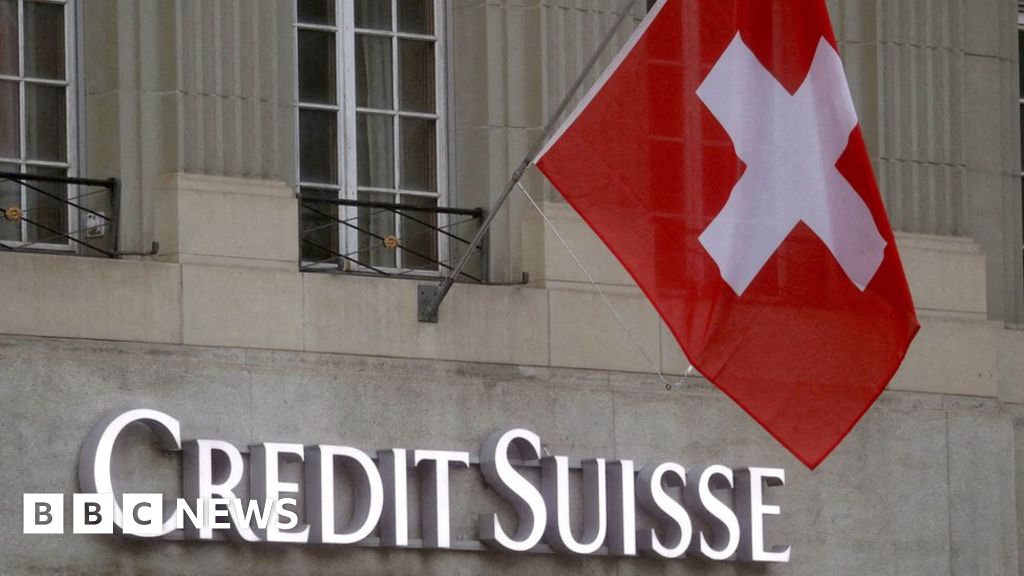Credit Suisse Emergency Loan Reassures Investors

European markets opened higher on Thursday after troubled bank Credit Suisse secured a £45bn funding deal.
Stock markets across the UK, France and Germany rebounded while Credit Suisse's share price surged by 40%.
Overnight Credit Suisse said it would borrow up to 50bn francs (£44.5bn) from Switzerland's central bank to shore up its finances.
Fears that Credit Suisse's issues could cause a wider banking crisis had sent stock markets tumbling on Wednesday.
The main stock market indexes in London, Frankfurt and Paris opened higher. By mid-morning, the FTSE 100 index in the UK was trading up 1%, with Lloyds Banking Group and Barclays among the biggest risers.
Credit Suisse had sought help from Swiss National Bank after revealing it had found "material weakness" in its financial reporting.
It led its biggest shareholder, Saudi National Bank, declaring that it would not buy more shares in the bank, sparking panic among other investors.
Switzerland's central bank said Credit Suisse had the money it needed but stressed it was ready to step in and help if needed.
The BBC understands that the Bank of England has been in touch with Credit Suisse and Swiss authorities to monitor the situation.
Problems in the banking sector surfaced in the US last week with the shock collapse of Silicon Valley Bank, the country's 16th-largest lender, followed two days later by the failure of New York's Signature Bank.
The US central bank had been forced to step in to prevent a run on bank deposits as panic spread.
Sir John Gieve, former deputy governor at the Bank of England, told the BBC that central banks were sending a "message" that such problems would be contained locally.
He added that in Credit Suisse's case, the Swiss National Bank's action was likely to be enough to stop the crisis spreading.
"What we've seen overnight is the Swiss central bank saying 'no, we will not let this get into a disorderly collapse'," he told the BBC's Today programme.
"I don't know what the future for Credit Suisse holds but so far they are still standing and it looks like the Swiss central bank will ensure it's standing long enough to rearrange its affairs for the future."
'Material weaknesses'
Credit Suisse, founded in 1856, has faced a string of scandals in recent years, including money laundering charges, spying allegations and high profile departures.
It lost money in 2021 and again in 2022 and has warned it does not expect to be profitable until next year.
The bank's disclosure on Tuesday of issues in its financial reporting renewed investor concerns.
Daniel Davies, managing director at Frontline Analysts, and a former bank analyst at Credit Suisse, said that the bank's "millionaire and billionaire client base just seems to have reached the end of their tolerance and they've been taking money out over the last six months at what began to look like an increasing rate".
He added that the Bank of England will have been asking its Swiss counterpart whether it still had faith in Credit Suisse.
"Because the nature of these crises is that when you have a real massive deposit run it is like a tsunami - nothing humans can make can stop it. The only thing you can do is stop it before it turns into a proper deposit run and the only people that can do that are the central banks."
Fears were intensified when the Saudi National Bank, Credit Suisse's largest shareholder, said it would not buy more shares in the Swiss bank on regulatory grounds.
On Wednesday shares in the lender plunged as other banks rushed to pull out their funds from the bank and prime ministers in Spain and France spoke out in an attempt to ease fears.
The collapse of Silicon Valley Bank has also fuelled concerns about the value of bonds held by banks, as rising interest rates made those bonds less valuable.
Central banks around the world - including the US Federal Reserve and the Bank of England - have sharply increased interest rates as they try to curb the rate of price rises, or inflation.
Banks tend to hold large portfolios of bonds and as a result are sitting on significant potential losses.
The falls in the value of bonds held by banks is not necessarily a problem unless they are forced to sell them.
Silicon Valley Bank - which specialised in lending to technology companies - was shut down on Friday by US regulators in what was the largest failure of a US bank since 2008.
From Chip War To Cloud War: The Next Frontier In Global Tech Competition
The global chip war, characterized by intense competition among nations and corporations for supremacy in semiconductor ... Read more
The High Stakes Of Tech Regulation: Security Risks And Market Dynamics
The influence of tech giants in the global economy continues to grow, raising crucial questions about how to balance sec... Read more
The Tyranny Of Instagram Interiors: Why It's Time To Break Free From Algorithm-Driven Aesthetics
Instagram has become a dominant force in shaping interior design trends, offering a seemingly endless stream of inspirat... Read more
The Data Crunch In AI: Strategies For Sustainability
Exploring solutions to the imminent exhaustion of internet data for AI training.As the artificial intelligence (AI) indu... Read more
Google Abandons Four-Year Effort To Remove Cookies From Chrome Browser
After four years of dedicated effort, Google has decided to abandon its plan to remove third-party cookies from its Chro... Read more
LinkedIn Embraces AI And Gamification To Drive User Engagement And Revenue
In an effort to tackle slowing revenue growth and enhance user engagement, LinkedIn is turning to artificial intelligenc... Read more

